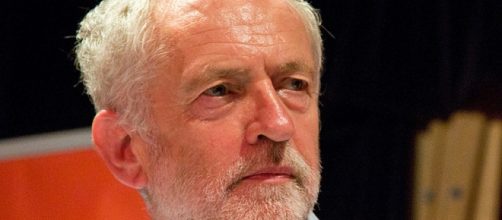A DRAMATIC appeal to David Cameron to intervene in the planned crucifixion of a Saudi teenager was a surprise addition to the first leader’s speech by Jeremy Corbyn this afternoon.
In his wide-ranging speech he addressed the Labour Party’s plans for more affordable housing, attacked tax credit cuts and vowed to renationalise the railways. However, commentators questioned why he failed to mention the deficit, an omission that haunted Ed Miliband after his speech last year.
The audience at the Labour Party Conference in Brighton was rapturous in their applause, but even some Labour commentators were unimpressed.
Mr Corbyn said that it was his mission to “change the party, change politics and change the way we do things.” He set a target for such change by getting back to winning elections from next May.
In a forthright appeal to Prime Minister David Cameron, he called for him to intervene “now, personally, with Saudi Arabia to stop the crucifixion of Ali Mohammed al-Nimr, a Saudi teenager.”
He went on to demand that the Government terminate a bid to provide prison services for Saudi Arabia.
This was a sign of his declaration that even as Labour leader he would never stop being a campaigner.
However, many political analysts were looking for signs about his domestic policies and he honed in on tax credits, reaffirmed the renationalization of the railways and gave his backing to the self-employed.
He said: “Cameron cuts Tax Credits for those who depend on them while he cuts inheritance tax for the rich.
“The self-employed should get support and have eligibility to maternity leave and sickness.”
That statement was applauded by Jonathan Hopkin, who said it was a “smart move to get behind the self-employed – a big group that needs help, but not used to Labour overtures.”
Corbyn also vowed: “Labour will renationalise the railways - this is a party commitment because it's what most people want.”
He told the Conference that since the General Election failure, more than 160,000 new members have joined the party, including more than 50,000 who joined since the leadership results.
He said his election had been a ‘political earthquake’ and said that he wanted a politics that was “kinder, more inclusive, bottom-up, not top-down… Straight talking.
Honest.”
To his own critics in the party he reached out: “I want open debate in our party. I will listen to everyone. I do not believe any one of us has a monopoly on wisdom and ideas. I want an open debate in our party.”
He said that he would not stop being an activist and used his speech to appeal to ‘traditional Labour values’.
"The new Trade Union Bill is also a fundamental attack on human rights and is in breach of the ILA and the ECHR," he said.
The Labour leader listed a number of areas where family insecurity had increased under the Conservative Government. These included housing, schooling, social care, tax credits, low wages and the bedroom tax.
“The Tories' economic record is for the few, not for the many,” he said.
On the refugee crisis, which he said was the biggest crisis ever, globally, he confessed he was ‘proud of the kindness people in Britain have shown refugees’.
He said he wanted to protect the jobs of all those who work on Trident, “so that we can gain from not renewing it.” But cast doubts on military action in Syria, saying that “a few more bombs will not solve the crisis”.
He criticized the Iraq War but stopped short of apologising for it on behalf of the Labour Party.
He also hit out at electoral reform plans, accusing the Conservatives of trying to ‘strike 2 million people off the electoral register’. He said this was gerrymandering and launched a new Labour campaign during his speech.
"From today our Labour party starts a nationwide campaign... to stop Tory gerrymandering and get people on the electoral register."
He also said that Labour would prioritise mental health and challenge the Tories on their appalling record by increasing funding.

